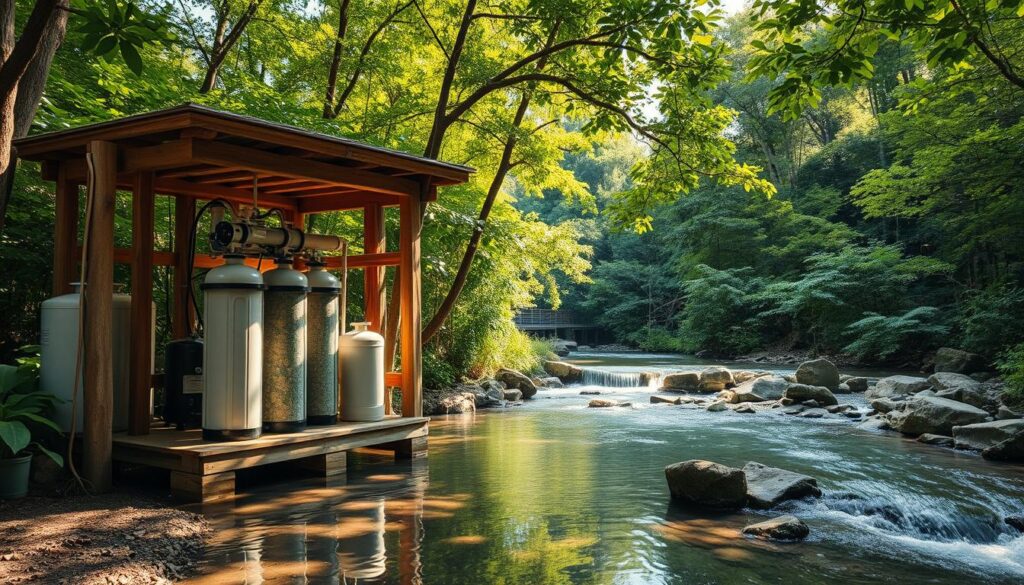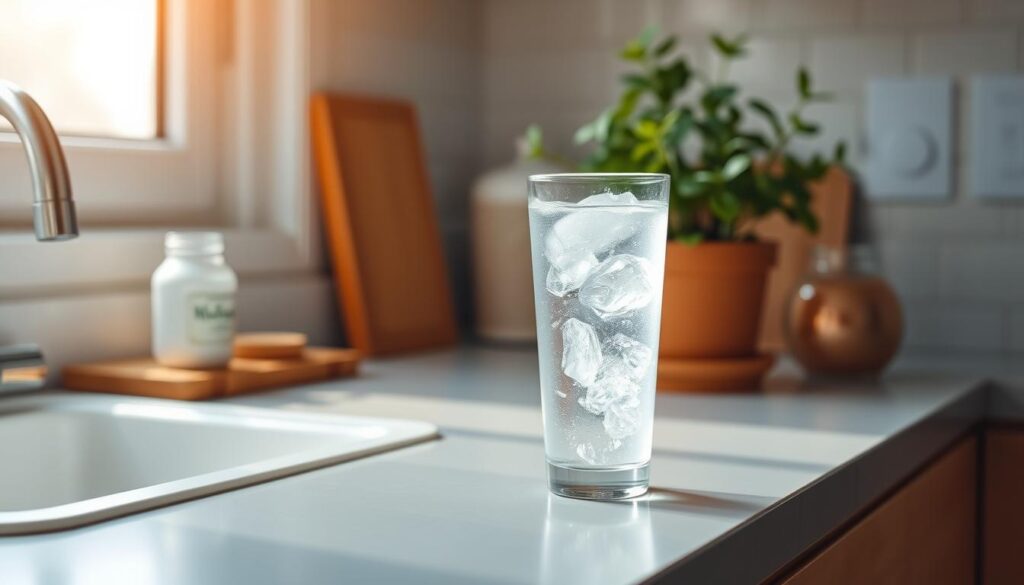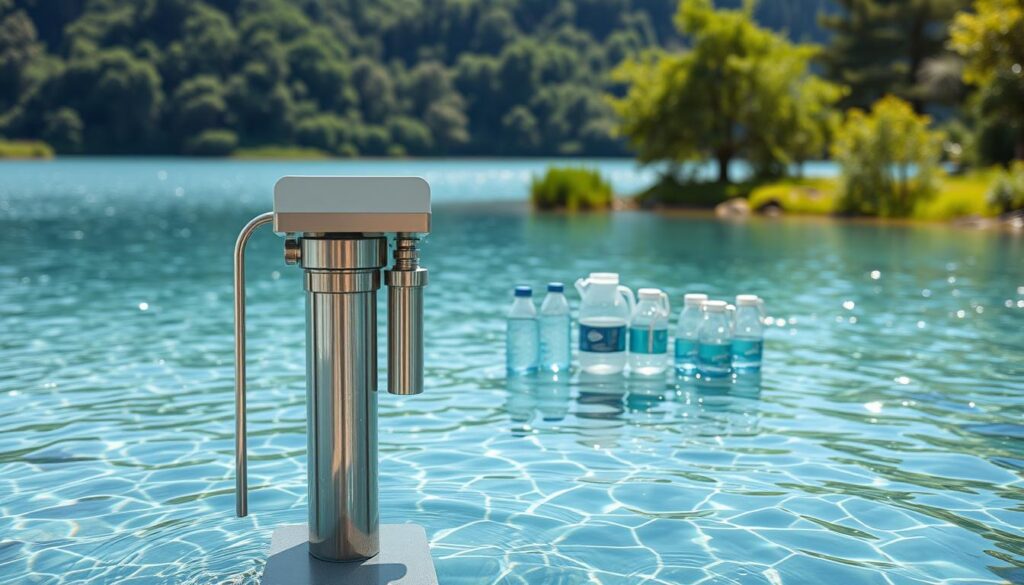Thinking about self-sufficient living made me see how vital clean water is. Living off the grid means you need to plan well, including how to purify water.
For me, finding good water treatment methods is key to a green off-grid life. It’s not just about finding water. It’s also about making sure it’s safe to drink.
Key Takeaways
- Understand the importance of water treatment in off-grid settings
- Learn about different methods for off-grid water purification
- Discover key considerations for self-sufficient water treatment
- Implement effective solutions for clean and safe water
- Ensure a reliable source of water for your off-grid living needs
Understanding the Importance of Water Treatment
Water treatment is very important, even more so for those living off the grid. Having clean drinking water is key to off-grid living. It greatly affects our health and well-being.
Why Water Quality Matters
Water quality is vital because it affects our health. Contaminated water can cause many health problems, from stomach issues to serious diseases. For those living off the grid, clean water is not just about health. It’s also about living sustainably.
Health Risks of Contaminated Water
Contaminated water can lead to serious health issues. It can spread diseases like cholera, typhoid, and dysentery. The presence of harmful substances can cause severe health problems.
- Gastrointestinal illnesses
- Parasitic infections
- Chemical poisoning
- Long-term health effects such as cancer and neurological disorders
Knowing these risks shows why good water treatment is essential for off-grid living. Proper water treatment can greatly lower the risk of waterborne illnesses. This ensures a healthier life.
Options for Sourcing Water Off-Grid
Starting off-grid living means finding reliable water sources. Clean water is key. You have several options, each with its own benefits and drawbacks.
Rainwater Harvesting
Rainwater harvesting is a top choice for off-grid water. It collects rainwater from rooftops or other surfaces. This method works best in rainy areas.
The collected water can be used for drinking, cooking, and irrigation. But, it needs proper treatment first.
To start rainwater harvesting, you need a system. This includes gutters, downspouts, and tanks. Make sure the collection surfaces are clean to keep the water quality good.
Spring and Well Water
Spring and well water are also good options. Springs flow naturally from the ground, while wells tap into underground water. Both can provide steady water, but testing the water is key to ensure it’s safe.
- Spring and well water often have a steady supply and may cost less to treat.
- But, they can get contaminated by nearby farms, septic systems, or pollutants.
Surface Water Sources
Surface water like rivers, lakes, and ponds can also be used. These are often easier to access but need more treatment because of contamination risks.
When using surface water, think about the area’s environment and pollution sources. You might need to filter, sediment, and disinfect the water to make it safe.
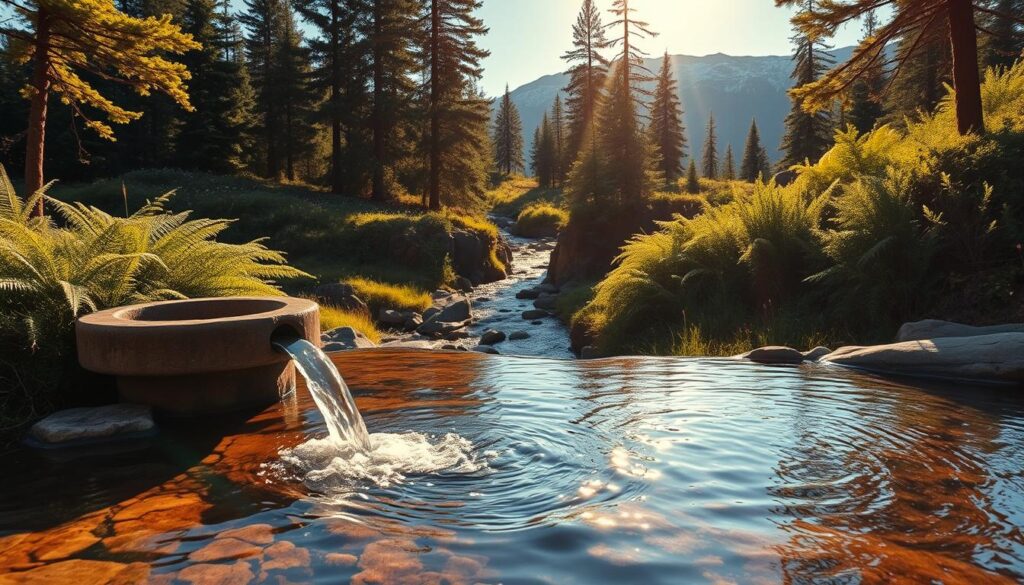
In summary, choosing a water source depends on many factors like climate, geography, and personal needs. Knowing the pros and cons of each option helps you pick the best for your off-grid life.
Filtration Systems for Off-Grid Living
In off-grid living, filtration systems are key to keeping water clean. They protect against harmful contaminants. Filtration is essential for ensuring safe drinking water.
Types of Filtration Systems
There are many filtration systems for off-grid living. Each has its own benefits and uses.
- Activated Carbon Filters: These filters get rid of chlorine, taste, and odor. But, they might not catch all contaminants.
- Reverse Osmosis (RO) Systems: RO systems remove dissolved solids, bacteria, and viruses. They are a top pick for off-grid water treatment.
- Ceramic Filters: Ceramic filters are tough and effective against bacteria and parasites. They are a solid choice for off-grid settings.
A study found that ceramic filters can remove up to 99.9% of bacteria and viruses. This makes them very effective.
“The use of ceramic filters in off-grid communities has significantly reduced the incidence of waterborne diseases.”
How Filters Remove Contaminants
Filtration systems work by trapping contaminants in a medium. The filter’s success depends on its size, material, and design.
| Filtration Method | Contaminants Removed | Effectiveness |
|---|---|---|
| Activated Carbon | Chlorine, taste, odor, some chemicals | Moderate |
| Reverse Osmosis | Dissolved solids, bacteria, viruses | High |
| Ceramic Filters | Bacteria, parasites, some viruses | High |
Knowing about different filtration systems helps off-grid dwellers choose the right one. This ensures they have clean water.
Purification Methods to Consider
For those living off the grid, water purification is a top priority. Ensuring that your water is free from pathogens and contaminants is key for health and safety.
There are several methods to purify water, each with its own advantages and effectiveness. Knowing these methods can help you pick the best one for your off-grid water treatment needs.
Boiling Water
Boiling water is one of the simplest and most effective methods of purification. By bringing water to a rolling boil, you can kill most bacteria, viruses, and other pathogens.
Effectiveness: High
Cost: Low to Moderate (depending on fuel source)
UV Light Treatment
UV light treatment involves exposing water to ultraviolet light. This light disrupts the DNA of microorganisms, making them harmless.
Portable UV purifiers are available, making this method convenient for off-grid use.
Effectiveness: High
Cost: Moderate to High
Chemical Purification Solutions
Chemical purification involves using disinfectants like chlorine or iodine to kill pathogens. While effective, these methods require careful handling and dosage.
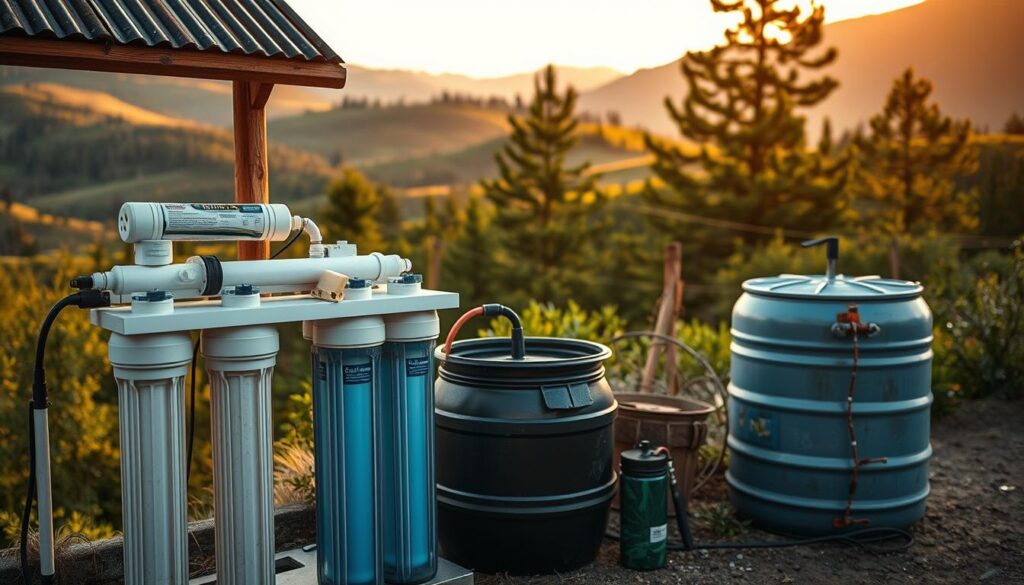
| Purification Method | Effectiveness | Cost |
|---|---|---|
| Boiling Water | High | Low to Moderate |
| UV Light Treatment | High | Moderate to High |
| Chemical Purification | High | Low to Moderate |
Each of these purification methods has its place in off-grid water treatment. By understanding the options available, you can make an informed decision on the best method for your needs.
Choosing the Right Equipment
For those living off the grid, having the right water treatment equipment is essential. It’s not just a convenience, but a necessity. It ensures access to safe and clean drinking water. Understanding the various options for water treatment in off-grid settings is key.
Essential Tools for Water Treatment
The essential tools for water treatment include different filtration systems and purification methods. These can range from simple ceramic filters to complex multi-stage systems.
Some of the key tools are:
- Water filters with different pore sizes to remove various contaminants
- Purification tablets or liquids that disinfect water
- UV light devices that kill bacteria and viruses
Portable Water Solutions
Portable water filters are a critical component of off-grid water treatment. They offer a convenient and effective way to purify water on the go.
These solutions are designed to be lightweight, durable, and easy to use. They are ideal for various off-grid scenarios.
| Equipment Type | Function | Portability |
|---|---|---|
| Water Filters | Remove particulate and microbial contaminants | High |
| Purification Tablets | Disinfect water | Very High |
| UV Light Devices | Kill bacteria and viruses | Medium |
In conclusion, selecting the right water treatment equipment is vital for off-grid living. By understanding the available options and choosing the most appropriate tools, individuals can ensure access to safe drinking water.
Building a Water Treatment System
I think it’s key to build a strong water treatment system for off-grid living. It’s not just for clean drinking water. It also keeps your water source clean over time.
Choosing the right filtration is critical when building your system. DIY filtration systems are affordable and can be customized.
DIY Filtration Systems
DIY systems can tackle specific water problems. For example, a sediment filter works well for particles. But for bacteria or viruses, you might need UV light or chemicals.
A basic DIY system has layers like sediment filters, activated carbon, and UV or chemical disinfection. Here’s how you might set it up:
| Filtration Stage | Function | Example Materials |
|---|---|---|
| Pre-filtration | Removes large particles | Coarse sediment filter |
| Activated Carbon | Removes chemicals and improves taste | Granular activated carbon |
| Disinfection | Kills bacteria and viruses | UV light or chlorine tablets |
Insulating and Protecting Your Setup
After building, protect your system from the environment. Insulation keeps it working well and lasts longer. Freezing can harm some parts, so insulate pipes and filters in cold areas.
Also, shield your system from sunlight, dust, and animals. Use a strong, weatherproof box to keep parts safe.
With good planning and protection, your water system will provide clean water for many years.
Testing Water Quality
Testing your water quality is key for staying healthy, even off the grid. Regular checks make sure your water is clean and free from harmful stuff.
For more info on finding safe drinking water, check out my guide on finding safe drinking water for your.
How to Test Water Parameters
Testing water parameters means checking its quality. This includes pH levels, how clear it is, and if there are harmful germs or chemicals. You can use field tests and lab analyses for this.
Field tests are quick and easy. They give you results right away. You can use test strips or portable meters to check pH and clarity.
Laboratory analyses give more detailed info. They check for specific contaminants. You need to send a water sample to a lab for these tests.
Understanding Testing Kits and Tools
There are many testing kits and tools for off-grid water quality. They range from simple test strips to advanced portable analyzers.
When picking a testing kit, think about what contaminants you want to find and how accurate you need the results. Some kits focus on certain things like bacteria or heavy metals. Others test more.
It’s important to know what your testing kit can do. Always follow the maker’s instructions to get accurate results.
Maintaining Your Water Treatment System
Keeping your off-grid water treatment system in good shape is key. It makes sure you always have clean drinking water. A well-kept system lasts longer and keeps the water safe.
Regular Maintenance Practices
Regular upkeep is vital for your water system’s health. This includes:
- Regularly inspecting the system for signs of wear and tear.
- Replacing filters as recommended by the manufacturer.
- Cleaning and disinfecting components to prevent bacterial growth.
By sticking to these steps, your system will work its best.
Troubleshooting Common Issues
Even with regular care, problems can pop up. Here are some common issues and how to fix them:
- Reduced water flow: Look for clogs in filters or pipes.
- Taste or odor issues: Check for contamination and replace filters if needed.
- System failure: Check the power source and electrical parts for problems.
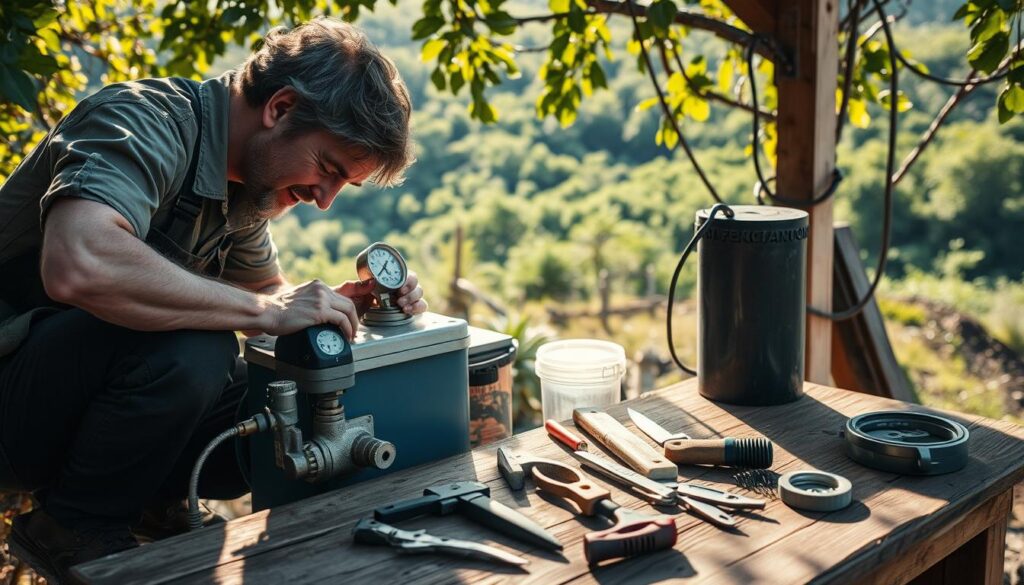
In summary, keeping your water system in check is critical for off-grid living. By following these tips, you can have a steady supply of clean drinking water.
Budgeting for Water Treatment
Understanding the costs of water treatment is key for off-grid living. The price of a water treatment system changes based on the technology and size.
When looking at off-grid water treatment costs, it’s important to break down the costs. This includes the cost of the equipment, maintenance, and any ongoing expenses like replacement filters or energy.
Cost Analysis of Different Solutions
A detailed cost analysis compares the costs of different water treatment methods. For example, rainwater harvesting systems might cost a lot at first but save money over time. On the other hand, chemical purification methods might be cheaper to start but cost more in the long run because of the need for constant chemical replenishment.
To show the cost differences, here’s a table:
| Treatment Method | Initial Cost | Ongoing Costs |
|---|---|---|
| Filtration Systems | $500-$2000 | $50-$100 per year |
| UV Light Treatment | $200-$1000 | $20-$50 per year |
| Chemical Purification | $100-$500 | $50-$200 per year |
Long-Term Savings from Effective Systems
Choosing a good water treatment system can save a lot of money in the long run. It can cut down on the need for bottled water and filter replacements. It also helps avoid expensive health problems from bad water.
For instance, a good filtration system might cost more at first. But it can provide clean water for years with little upkeep, saving money overall.
By looking closely at the costs and benefits of different water treatment options, off-grid residents can make smart choices. They can find a balance between their budget and the need for clean, safe water.
Regulations and Guidelines
Exploring off-grid water treatment shows how important rules are. Living off the grid means you must follow local laws about water use and safety.
Understanding Local Water Use Laws
Local water laws differ a lot. It’s key to know the rules in your area. These laws might affect where you get your water, like from rain, wells, or springs.
Following these laws helps avoid legal trouble. It also makes sure your water source is good for the environment.
In some places, you need permits for certain water sources or systems. Always check and get any needed permits before starting your off-grid water setup. Knowing local health guidelines also helps meet water quality standards.
Safe Practices for Off-Grid Water Systems
Keeping your off-grid water system safe is critical. This means regular checks on your equipment, proper waste disposal, and making sure your system can handle local weather.
Testing your water regularly is a must. You can use DIY kits or send samples to labs. This way, you catch problems early and fix them before they get worse.
Teaching your family about water conservation is also important. Fixing leaks and using water-saving appliances can help a lot. These actions cut down on water use and system stress.
By following local water laws and safe practices, your off-grid water system will be legal and safe. It will give you clean water for many years.
Environmental Considerations
Off-grid water treatment has a big impact on our environment. It’s key for those wanting a greener lifestyle. We need to know how it affects local ecosystems.
Impact on Local Ecosystems
Off-grid water systems can harm local ecosystems if not managed right. Taking water from nature can change habitats and mess with the water cycle. We must think about these effects before setting up any system.
Key Considerations:
- Check the local water table and how fast it recharges
- Look at how it might affect habitats
- See how much energy the system needs
A quote from the Water Environment Federation shows why we need to manage water sustainably:
“Sustainable water management is critical to ensuring the long-term health of our ecosystems and communities.”
Sustainable Water Use Practices
Using water sustainably is key to lessening the harm of off-grid systems. This means using efficient treatment, cutting down on waste, and saving water.
| Sustainable Practice | Environmental Benefit |
|---|---|
| Rainwater harvesting | Reduces demand on natural water sources |
| Water-efficient appliances | Lowers overall water consumption |
| Recycling water | Minimizes wastewater and conserves resources |
By using these practices, we can greatly reduce our environmental impact. As more people adopt sustainable water practices, our ecosystems will get better.
In short, we must think about the environment when using off-grid water systems. Knowing the effects and using green practices helps us live better and protect our planet.
Personal Experiences with Water Treatment
Setting up off-grid water treatment systems has been a learning journey. I’ve learned a lot about the challenges and successes of getting clean water in remote places.
Real-World Lessons
One key lesson came from a rainwater harvesting project. It showed me how important regular checks and upkeep are. Without them, even the best systems can fail.
Achieving Success
Many success stories have shown how well-designed systems work. For example, a community using a DIY filter saw fewer waterborne illnesses. These stories prove the power of off-grid water treatment.
I share these experiences to encourage others to use sustainable water treatment. Clean drinking water is precious, and we should all value it.
FAQ
What are the most common contaminants found in off-grid water sources?
Common contaminants include bacteria, viruses, heavy metals, and other pollutants. These can be found in rainwater, surface water, and groundwater.
How do I choose the best water treatment method for my off-grid needs?
The best method depends on your water source’s quality and the contaminants present. It also depends on your needs, like the water volume and available equipment.
What is the difference between water filtration and purification?
Filtration removes particles and some microorganisms. Purification kills or removes pathogens, making water safe to drink.
Can I use a DIY filtration system for my off-grid water treatment?
Yes, DIY systems can work well. But, they need careful design and regular maintenance to effectively remove contaminants.
How often should I test my off-grid water quality?
Testing should be regular, ideally every few months. Or after any changes in your water source or treatment system. This ensures the water is safe to drink.
What are the costs associated with different off-grid water treatment solutions?
Costs vary widely. They range from low-cost DIY solutions to more expensive commercial systems. Consider long-term savings when choosing.
Are there any regulations I need to be aware of when setting up an off-grid water system?
Yes, local regulations and guidelines are important. They cover water use, treatment, and disposal. Make sure to follow them for safe operation.
How can I minimize the environmental impact of my off-grid water system?
Use sustainable water practices like conserving water and eco-friendly treatment methods. Protecting local ecosystems also helps reduce environmental impact.
What are some effective methods for purifying water in off-grid settings?
Effective methods include boiling, UV light treatment, and chemical purification. Each has its own advantages and limitations.
How do I maintain my water treatment system to ensure it remains effective?
Regular maintenance is key. This includes cleaning, replacing filters, and checking for damage. It ensures your system keeps providing safe drinking water.
What are the benefits of investing in a self-sufficient water treatment system?
A self-sufficient system offers independence from municipal water. It reduces reliance on external resources and can save money in the long run.
How can I ensure my off-grid water system is resilient to extreme weather conditions?
Design your system with resilience in mind. Use protective measures like insulation. Have contingency plans ready to minimize extreme weather impacts.

